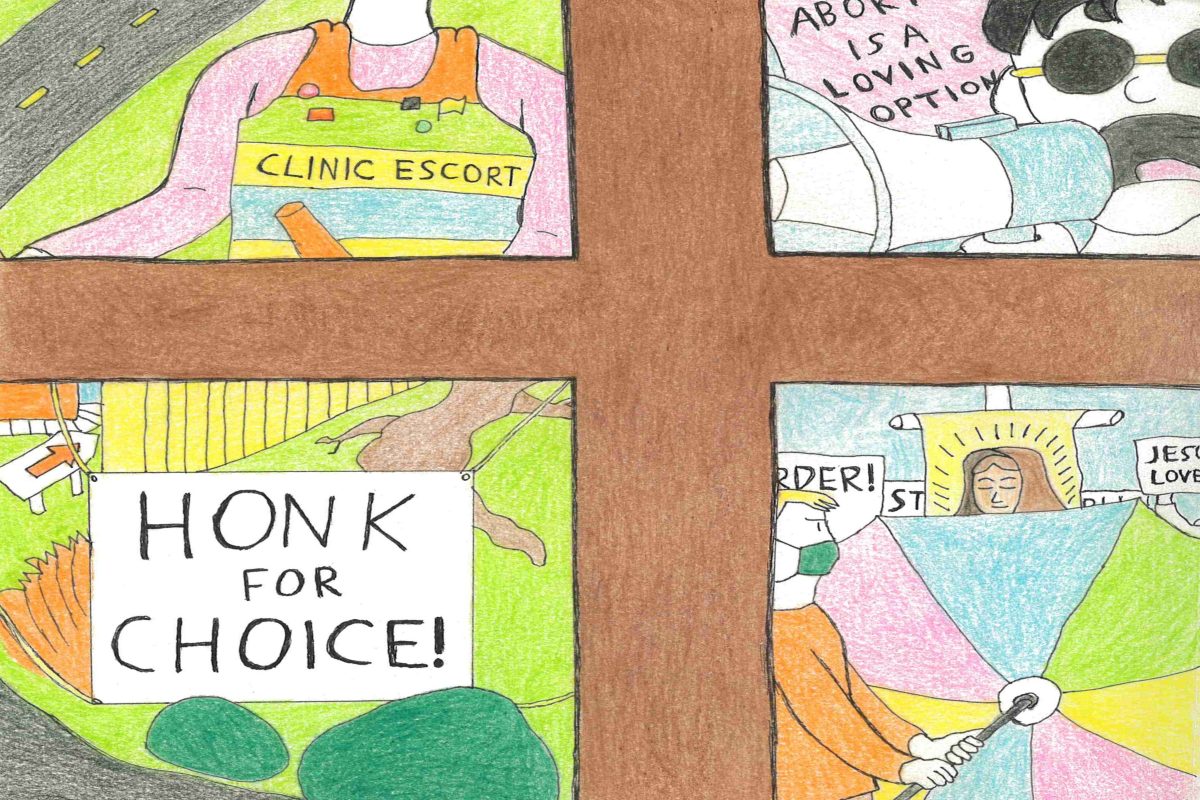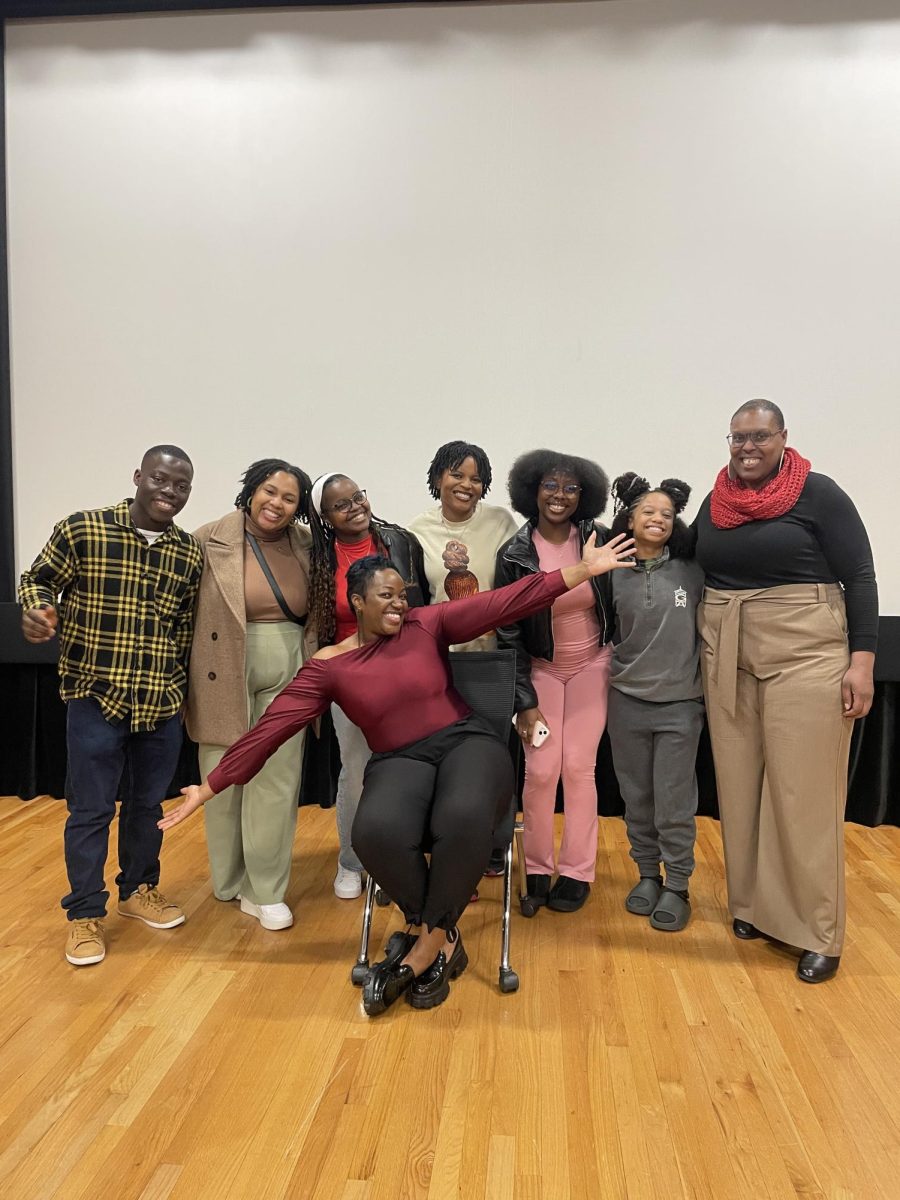I have thought for years about experiences I think everyone should have at least once, and I’ve recently found a strong new contender for that list: clinic defense—the act of defending an abortion clinic from anti-abortion protesters. I first heard about it through my friends in the Youth Democratic Socialists of America (YDSA), and they encouraged me to join them one weekend.
A defender’s job is to prevent pro-life protesters from making the patients at the clinic feel uncomfortable by directing patients as they drive in and out, blocking graffiti, putting up signs and keeping the protesters preoccupied with conversation. The ultimate goal for us is to do everything we can to support the women at the clinic who are in vulnerable situations.
The most striking aspect of clinic defense is the people you meet in front of the clinic. They often come in waves, each group different from the last. The first wave is a group of elderly people who hold up posters with anti-abortion slogans and pictures of babies who were “saved.” Aside from their posters, they are a fairly relaxed group. They trot down the street around 8 a.m., take up their spots and then we block their posters with rainbow umbrellas so patients do not have to see them. After an hour, they pack up, say goodbye and head home.
It is common to strike up a conversation with this wave. They are friendly and enjoy getting to know people on our side. We all give each other fake names, though, just in case. We can have meaningful discussions while they are there, like the one I had with a man who introduced himself as Tig. We talked about why both of us were there, as well as our beliefs about God and the Universe. We even said a short prayer together before Tig left.
It’s refreshing to have civil discourse with people about such a divisive issue, but these conversations can feel meaningless after a while. I’ve done clinic defense four times so far, and I can attest that a lot of the conversations follow a similar vein. We ask our first round of questions, start enumerating our beliefs and find that there are many we both share, but then we hit the most important question: whether or not abortion is murder. We can give reasons for why we both came to adopt our differing stances, but every time we stumble upon that one question, we start again at the beginning. Moments like those make it seem like finding common ground is impossible.
The second wave is more of a challenge in patience. Instead of holding up posters, they hold prayer circles, recite Bible verses and try to stop cars as they enter and exit the clinic. The relationship between clinic defenders and the protesters is more heated for this group. They kick down signs and posters and refuse to listen to what we have to say. so In turn, the defenders are similarly guarded and vigilant to make sure that we can warn oncoming cars not to stop for these protesters.
Lastly, there is the third wave. Between 9 and 10 a.m, a group of church-goers finished with their service come out in one massive line and pray on the other side of the street, with a pastor on a microphone delivering a mini-sermon about why he thinks abortion is wrong. He calls all the patients, doctors and clinic defenders cowards.
Thankfully, the third wave rarely stays outside for longer than 15 minutes before retreating back to their church. It is almost laughable for those of us that stay there for hours at a time. The only problem with their thin skin is that they are much more likely to call the police on clinic defenders for trespassing than any other wave. Most of the regulars on defense know the legal boundaries and codes of every building on that street and make sure that no one on our side comes close to breaking any laws.
I have not yet met any practicing Christians on the defender side, and I can understand why. It is upsetting to see the anti-abortion side weaponize their faith as a means to bring about shame through rosary graffiti, performative prayer and giant posters of the Virgin Mary. Don’t these stunts go against what the Bible teaches? One of the main tenets I learned from church is to not throw around righteousness in public.
It can be hard to tell if any interactions you have with the other side actually accomplish anything. The whole experience sounds like it would be draining, but, by some miracle, it is not. That is because of something we encounter every time we go: the patients. It seems like a small thing, but being there for every car that drives in and warning them to not engage with the protesters makes you feel like you are doing something necessary. If we are not there to give the patients a hand with the pro-lifers, who will?
I have never regretted going to the clinic, even on weekends when major assignments were due. I encourage everyone to experience hands-on work like this, whether it be clinic defense or something else in the community that forces you to interact with people, especially those who disagree with you.




































